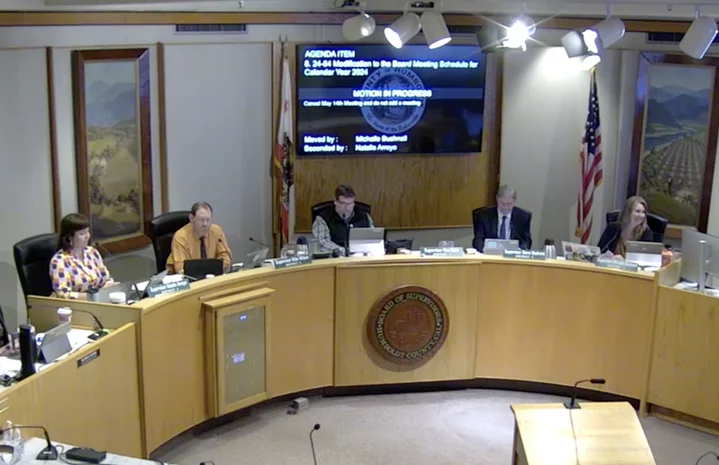The Humboldt County Board of Supervisors (from left): Natalie Arroyo, Mike Wilson, Rex Bohn, Steve Madrone and Michelle Bushnell.. | Screenshot.
###
The Humboldt County Board of Supervisors held a relatively brief meeting today, wrapping up their open session items before hitting the lunch break shortly after 12:30 p.m.
Partly that was due to a clerical error that forced the board to postpone an appeal hearing for a contentious McKinleyville subdivision and housing development project. (More on that below.) But the board still found time to take on some big-ticket issues.
Our summary of the day’s proceedings can be found below.
Mental health programs
Early in the day, Humboldt County Behavioral Health Director Emi Botzler-Rodgers discussed some major potential changes to the ways in which both the state and the county respond to people suffering from homelessness, mental illness and/or substance use disorder.
In particular, she talked about some potential impacts from two major pieces of state legislation:
- California’s Mental Health Services Act (MHSA) reform, which will appear on primary ballots in March as Prop. 1, and
- Senate Bill 43, which broadens the definition of “gravely disabled,” a change that will make a lot more people eligible for involuntary conservatorship.
The MHSA bill, which is a cornerstone of Governor Gavin Newsom’s agenda for behavioral health and homelessness, would dedicate billions of dollars to new behavioral health housing while expanding services to people with substance use disorders, among other provisions. On the local level, however, it “has the potential to substantially impact the work that we do and the funding that we have available,” Botzler-Rodgers said.
If passed, the measure would result in reduced funding for counties and less control over those funds, she explained.
As for SB 43, Botzler-Rodgers said it will significantly change the definition of who’s eligible for what’s called LPS conservatorship, a legal process that allows a court to appoint a conservator to make legal decisions for a seriously mentally ill person.
The bill would expand eligibility to include any person who has a severe substance use disorder, which would dramatically increase the percentage of the population that’s potentially subject to detention and conservatorship — from roughly one percent to about 10 percent.
“That’s a huge, huge increase,” Botzler-Rodgers said. “Not only is it a huge number of individuals who would then qualify to be conserved and treated, [but] there is a substantial lack of facilities to provide the services and virtually none for the [substance use disorder] population.” That’s a problem throughout the state, she added.
With no state funding set aside to support these expanded obligations, almost all counties in the state have requested a delay in implementing SB 43 until January 1, 2026, at the latest. At staff’s request, the Board of Supervisors today agreed to make that same request.
Later in the presentation, Jack Breazeal, deputy director of behavioral health, gave an update on the county’s pilot program for implementation of Laura’s Law, aka Assisted Outpatient Treatment (AOT). During the 2022-23 fiscal year, the county’s Behavioral Health Branch received 33 referrals for that program, 22 of which met the criteria to receive services. One person met the criteria for involuntary for involuntary treatment, Breazeal said.
“Most of the other individuals we were able to engage at some level” with varying degrees of success, he explained, adding that housing is a major challenge for implementation since many of the people the program engages are unhoused.
Also seated at the presentation table was Paul Bugnacki, deputy director of mental health, who discussed the inpatient side of AOT implementation.
Sempervirens, the county’s acute psychiatric hospital, had 254 admissions during the last fiscal year at a cost of $10.8 million, with the county’s general fund covering a larger portion of that price tag than in recent years due to decreased revenues collected via Medicare and private insurance.
Bugnacki said there’s limited funding available to implement the AOT program.
“This is going to be a big lift for counties, especially our county, and it’s going to impact multiple departments throughout our system,” he said.
When these issues were being discussed by the board, Fourth District Supervisor Natalie Arroyo spoke with evident emotion.
“There’s just something very moving about how hard you all work,” she said. “I think it’s a very under-appreciated field of work in behavioral health.”
Changes to Measure Z
Later in the meeting, the board considered changing how it allocates funds from Measure Z, the county’s half-percent sales tax measure dedicated to public safety and essential services.
The Measure Z Citizen Advisory Committee, which makes funding recommendations to the board, asked for a change to the revenue award process so that it would occur only once per year, concurrent with the budget adoption. This would eliminate the contentious mid-year allocations that have been standard up to now.
The committee also asked the board to reserve $5.4 million in savings from the last fiscal year to be allocated in the 2024-25 funding round. And, lastly, they asked the board to establish a reserve account, in which money could be set aside and used when there’s not enough to finance projects in the board’s previously approved three-year spending plan.
Deputy County Administrative Officer Sean Quincey explained that there’s currently some funding available for “high priority projects” thanks to a decision last year to de-allocate previously approved staff positions, and the board spent a good amount of time discussing whether and how that money should be spent.
Second District Supervisor Michelle Bushnell made a push to award more money to the fire prevention efforts of the county’s assorted fire departments while First District Supervisor and Board Chair Rex Bohn advocated giving at least $1 million to the Public Works Department for much-needed road repair work.
Public Works Director Tom Mattson made the same appeal, urging the board to award Measure Z funds for roadwork and equipment replacement now before conditions get worse and costs go up.
Fifth District Supervisor Steve Madrone said he’d planned to make a motion to adopt all of the advisory committee’s requests, which were also staff’s recommendations, “but given what’s happened the last couple of weeks [with storm damage] and given the deferred maintenance on our roads, I would very much like to see some funding go to roads sooner than later.”
Bushnell said that since both roads and fire prevention were shorted on their most Measure Z funding requests last year, she’d like to give them some funding now, at the mid-year point. She made a motion to award $1 million to each of those efforts, but none of the other supervisors offered a second.
Arroyo and Third District Supervisor Mike Wilson said they were inclined to go with staff recommendations, though Wilson said he’d consider allocating $500,000 to roads.
Arroyo said that Measure Z fundamentally over-promised, with sweeping ballot language about funding emergency services when the reality has been declining discretionary revenues each year. And she argued that the board should go with the advisory committee’s recommendations as a show of support.
“If we want to have meaningful engagement in the Measure Z process in the future – and, really, meaningful engagement in all of our committees and commissions and boards … – I do think we need to strongly consider and adopt the recommendations whenever possible,” she said.
Bohn held firm in his advocacy for $1 million to roads, and after a good deal of discussion the board voted on a motion to do just that, while adopting the rest of staff recommendations, including the elimination of mid-year awards going forward.
The motion passed 3-2 with Arroyo and Bushnell voting no.
Other stuff
One of several photos of road damage shown during a presentation from Public Works Director Tom Mattson. | Screenshot.
- The board ratified Sheriff Billy Honsal’s declaration of a local emergency caused by widespread flooding from the record-breaking downpour of January 13. Ryan Derby, director of the county’s Office of Emergency Services, reported that the county suffered $4.7 million in damages, mostly to county roads and bridges. Supervisor Wilson noted that climate change is making storms stronger and said future land use planning should focus on avoiding development in dangerous areas. Damage reports will be submitted to the state and federal governments for possible financial assistance.
- For the second week in a row, an appeal of the Planning Commission’s November 16 approval of a McKinleyville subdivision and housing development project was postponed. This time the delay was necessary due to an error in the agenda packet, with the appellants’ information mistakenly not included. Planning and Building Director John Ford apologized for the omission. The project would see a 2.47-acre property subdivided into 19 parcels for development of a multi-family housing project just east of the McKinleyville Town Center. The Planning Commission approved the subdivision over opposition from neighbors, quite a few of whom offered public comment today, criticizing the project’s density, design and parking accommodations. They’ll get “another bite at the apple” (a favorite Bohn phrase) when the rescheduled appeal hearing is heard on Friday starting at 11 a.m.


CLICK TO MANAGE